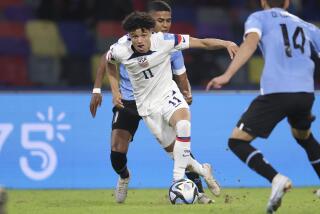Sticking Around : A Member of U. S. Field Hockey Team at the Tender Age of 17, Mike Lee Has Been a Fixture Since
- Share via
Eight years ago, when Mike Lee attended Sinaloa Junior High in Simi Valley, he was smaller than most youths but excelled at gym sports. One day, Lee recalls, “a guy came to school to give a demonstration on field hockey. I didn’t even know what field hockey was.”
He quickly learned. Field hockey, which goes back to the days of the Persian Empire (circa 330 B. C.) is a precise, hard-hitting sport in the mold of ice hockey, soccer and lacrosse. Contrary to its image in this country, it is not primarily for women, although the U. S. school system has virtually made it the national phys-ed class for girls.
Lee also learned to play field hockey. And as soon he picked up the short mulberry stick, whirled it from side to side with quick flicks of his wrist and pushed a baseball-sized plastic ball upfield, he became a standout who could compete against men before he was a teen-ager.
“I found it easy,” he says. And he found his sport.
In 1980, at age 13, he was the youngest field hockey player at the National Sports Festival. The next year, he was picked for the U. S. Junior National Team. In 1984, when he was only 17, he was selected for the Olympic Trials. Although he was the next-to-last player cut and missed the Olympics, he has been on the National Team ever since.
This year, while players on other U. S. national squads are preparing for the Seoul Olympics in September, the field hockey team is at home, waiting for 1992. Like soccer, field hockey requires elimination rounds. In a zone that encompasses the entire Western Hemisphere, the U. S. team finished third to Canada and Argentina, and only the top two teams go to South Korea.
Lee, however, found consolation in his selection as the 1988 U. S. field hockey athlete of the year by the U. S. Olympic Committee. In April, he and athletes of the year in other Olympic sports were hosted at a formal White House dinner by Vice President George Bush.
At only 5-8, 140 pounds, Lee is lucky to have “fallen in love” with field hockey and not basketball. And there is no doubt that the match would not have been made without Tom Harris. Harris, a Westlake Village civil engineer, was the man who demonstrated field hockey to Lee eight years ago. He is to field hockey in California what Johnny Appleseed is to the cider industry.
Harris became involved in field hockey nearly 20 years ago and has been staging the California Cup competition for 17 years. (The tournament this weekend at Moorpark College is expected to draw 58 teams, including squads from Taiwan and Jamaica.) Harris also has been responsible for turning Ventura County, with Moorpark as its hub, into the field hockey capital of America.
Besides Lee, local athletes Mohammad Barakat, Alvin Pagan, Tommy Hoang, Dave Wisner, John Spencer, Gary Newton and John O’Hara all played on the national team. That’s half the squad. All came up through the Field Hockey Federation, the local equivalent of Little League baseball. Harris, along with Bob Wisner and Walt Robbins, has been running the league since 1982. It has about 350 players this year, Harris says. Parents come out to games with coolers and lawn chairs to watch their youngsters whack the cork-filled ball across the 100-by-60-yard field.
Harris is a member of the executive board of the Field Hockey Assn. of America, which is part of the USOC. He estimates that there are only 2,000-3,000 field hockey players in this country. Not unexpectedly, the United States has never been a world power in the sport. India, Pakistan, Australia, Britain and the Netherlands dominate.
The U. S. national team, he says, ranks among the top 20 in the world, “but if you put us in an Australian or Dutch league, we’d be 20th if we were lucky.”
The Dutch alone have 100,000 players, and the smallness of the country enables national team members to easily converge for practice; but America’s vastness makes team practice difficult and expensive, Harris says.
Still, the quality of the U. S. team is improving. “Against Australia we’d lose something like 3-1,” he said. “We don’t get blown out anymore. In 1979, Holland beat us, 12-0. We’ve made a big improvement since then.”
One of the reasons is the presence of Ric Purser, an Australian who was hired by the FHA to coach the national team. But field hockey in this country won’t reach higher levels unless the fields improve, Harris says. Like basketball players, field hockey players need a smooth surface on which to dribble. But the fields Harris uses are as pitted as the top of a pepperoni pizza.
“That’s the biggest problem we have,” he said. The 1984 Olympics field hockey site in East Los Angeles costs $300 a day to rent, Harris says. Amateur field hockey did receive a boost from the Olympics--a $38,000 grant from the Amateur Athletic Foundation of Los Angeles as part of the Olympic surplus--but the money is not enough to turn the United States into a field hockey factory.
“We’ve maximized what we have and gone as far as we can go,” Harris said.
If field hockey had the big-time glitter and rewards of mainstream sports, Mike Lee probably would have had an easier time at home. His father never could understand why Mike devoted himself to an activity that would get him nowhere in the real world. Don Lee, a Korean immigrant who worked his way through USC and became a mechanical engineer, was upset when Mike dropped out of Moorpark College to concentrate on field hockey.
“We had a falling out and he said I couldn’t continue to play hockey and live at home,” Lee said. So he moved out and lived with friends in the Valley. “My life was all hockey,” said Lee, who subsequently has reconciled with his father, moved back home to Simi Valley and enrolled at Pierce College.
Aside from working out almost daily, Lee, 21, officiates youth field hockey games and practices with the national team to keep sharp for the Intercontinental Cup matches next year in New Jersey. All the major field hockey countries will have teams entered and “it’s bigger than the Olympics,” Lee said.
In the back of his mind is the 1992 Summer Olympics in Barcelona, Spain. Lee plans to be there. “When you win an athlete of the year award,” he said, “they expect you to stay around.”
More to Read
Go beyond the scoreboard
Get the latest on L.A.'s teams in the daily Sports Report newsletter.
You may occasionally receive promotional content from the Los Angeles Times.






